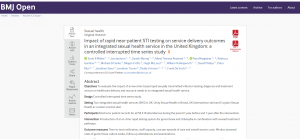Introducing rapid STI testing has many benefits for sexual health services
12 January 2023
Introducing rapid testing for gonorrhoea and chlamydia in sexual health clinics improves notification times for patients while maintaining clinic activity and reducing overall cost, according to the results of a study conducted by NIHR ARC West researchers and published in BMJ Open.
Demand for HIV and sexually transmitted infection testing is on the rise, but local authority budgets for sexual health services are shrinking. This study is the latest in a four-part evaluation of a service redesign implemented by Unity Sexual Health, a Bristol-based sexual health services provider.
In 2018, Unity Sexual Health introduced a new service where patients drop off their samples which are then checked with new rapid testing equipment, so that results, treatment and advice can be given within hours. As most sexual infections don’t cause any symptoms, early detection and treatment can help stop infections spreading and prevent serious disease developing.
During their evaluation, NIHR ARC West researchers wanted to see how the new service affects the cost and delivery of care. They reviewed electronic patient records for patients who had attended clinics during a one-year period before and a one-year period after the intervention was introduced.
They compared data from the intervention site (Unity Sexual Health) and a control site (Croydon Sexual Health in London), which hadn’t introduced rapid testing but provided services to a similar number of patients and used some of the same systems as Unity Sexual Health.
Overall, the study team found that patients were being notified much more quickly about their status because of rapid testing. They found that fewer gonorrhoea swabs were being sent for additional testing and that other clinic activity – rates of examination, follow-up visits and staff capacity to deal with patients – remained at the same level. This meant that less time and resources were needed to deal with patients who turned out to be infection-free and this contributed to a reduction in the overall costs of delivering the service.
This was the first study to quantify the effect of rapid chlamydia and gonorrhoea testing on gonorrhoea culture swabs, time-to-notification, examinations, follow-up visits, staff capacity and costs. However, it is the third in a series of papers the NIHR ARC West team have worked on within this project. So far the study team has published a paper that used computer modelling to analyse the flow of patients and resources at the clinic and they have interviewed patients and staff to understand their experiences and views.
Paddy Horner, Associate Professor in Sexually Transmitted Infections at the University of Bristol and clinical lead, said :
“We have been able to demonstrate for the first time that not only was a rapid sexual health service valued by patients and staff, but it also improved the quality of care at a reduced cost.
“This study compliments our previous qualitative evaluation and strengthens the case for more widespread rollout of this service model in sexual health services.”
Dr Scott Walter, Senior Research Associate at NIHR ARC West and lead author, said :
“Our study revealed some clear benefits associated with the introduction of rapid chlamydia and gonorrhoea testing within an integrated sexual health service.
“Not only do people get the right treatment faster, but it is also much less stressful for patients to wait a few hours for results compared to waiting a week or more.”
Frank De Vocht , Professor in Epidemiology and Public Health at the University of Bristol and co-lead, said:
“The results of this quasi-experimental evaluation provide real-world evidence to support the benefits of a rapid testing service and there is real potential for other sexual health services to benefit from implementing this model.
Paper
